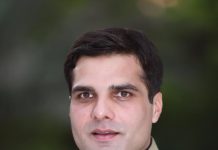Indian occupied Kashmir’s veteran politician and freedom fighter Syed Ali Shah Geelani was laid to rest early on Thursday in Srinagar, as authorities blanketed the region with troops and clamped down on communications to prevent protests.
Geelani, 92, was buried in a graveyard near his home before dawn with only a few hundred people, including his family and neighbours, allowed to attend the funeral, a government official said.
“There was heavy security at the funeral, including plain clothes policemen,” the official said.
As most Kashmiris remained locked inside their homes, police and soldiers patrolled the tense region. Government forces placed steel barricades and razor wire across many roads, bridges and intersections and set up additional checkpoints in towns and villages in the Kashmir Valley.
Geelani, who died on Wednesday, had been unwell for some time, his family said.
Geelani was buried in a local graveyard in a quiet funeral organised by authorities under harsh restrictions, his son, Naseem Geelani, told The Associated Press.
He said the family had planned to bury him at the main graveyard in Srinagar, the region’s main city, as specified in his will but were not allowed to do so by police.“They snatched his body and forcibly buried him. Nobody from the family was present for his burial. We tried to resist but they overpowered us and even scuffled with women,” Naseem Geelani said.
Among the most prominent political leaders in Kashmir – a Himalayan region claimed by both India and Pakistan in full, but ruled in parts – Geelani for years led an alliance of freedom fighters known as the Hurriyat Conference.
But the group split in 2003, when hardliners led by Geelani, who advocated Kashmir’s merger with Pakistan, walked out after moderates decided to hold talks with New Delhi. He was kept under house arrest more than a decade after leading several anti-India protests.
Around Geelani’s home and elsewhere in Srinagar, armed troops lined main roads and manned checkpoints, a Reuters witness said, as authorities sought to prevent protests in the wake of his passing.
The city’s main business area remained deserted, with most shops closed, and the movement of vehicles restricted, the witness said. Authorities also cut internet connections and mobile networks in the Kashmir valley since late on Wednesday.
The clamp down echoes restrictions that were imposed in August 2019 when Indian Prime Minister Narendra Modi split Jammu and Kashmir – then the country’s only Muslim majority state – into two federally-administered territories.
The shock move was opposed within Kashmir, including by the likes of Geelani who quit his hardline Hurriyat Conference faction, saying that it had failed to counter New Delhi’s efforts to tighten its grip on the disputed region.









